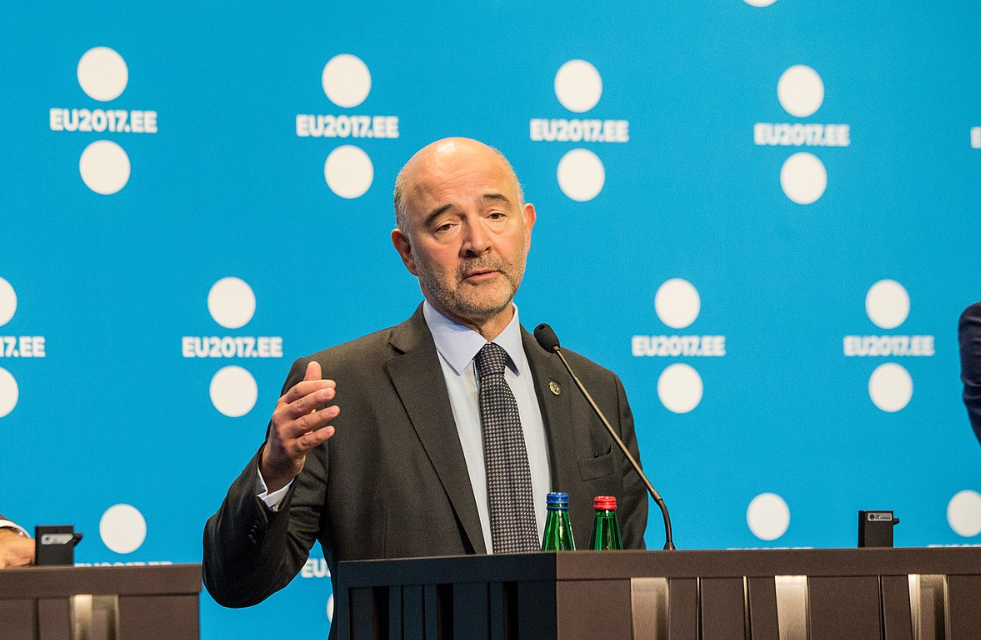“I have never been a supporter of sanctions. Sanctions are always failure,” said Moscovici, quoted by Reuters, on the sidelines of the meeting of EU finance ministers.
However, in response to a question from journalists about Italy, he said: "I want a dialogue, but sanctions can eventually be tried on if we cannot reach an agreement."
In October, the European Commission rejected the draft budget of Italy. The negative conclusion means that the executive body of the EU is asking the Italian government to review and resubmit its budget plan.
Italy set a budget deficit target of 2.4% of GDP in 2019 (three times the previous target), 2.1% in 2020 and 1.8% in 2021
The target ratio of debt to GDP is set at 130.9% in 2018, 130% in 2019, 128.1% in 2020 and 126.7% in 2021.
According to EU rules, the country's budget deficit should not exceed 3% of GDP, and public debt should be no more than 60% of GDP. Although the planned Italian budget deficit is less than 3%, its increase compared with the previously agreed level has caused discontent of the European Commission. Rome is given three weeks to make changes to its spending plans and resubmit them to Brussels.
According to Moscovici, a decision has not yet been made on possible measures with respect to Italy, since Rome still has a week to change its budget plans.
"On November 13, we expect a confident, accurate response from the Italian government," said the European Commissioner.
Italian Finance Minister Giovanni Tria confirmed on Monday that the country's budget will not change, and insisted that the planned budget deficit for the next year would not increase the country's huge scale debt, which exceeds 130% of GDP.
EU officials said that if the Italian budget is not amended, the European Commission is likely to respond to this at a meeting on November 21, publishing a critical report on the country's debt. This will be the first step in the disciplinary procedure in respect of Italy, said Reuters.
Brussels may ask Italy to transfer an interest-free deposit of 0.2% of its GDP to the block rescue fund, the European stabilization mechanism.
The Commission could also set a deadline for Italy to take measures to reduce its debt. Eurozone governments will need to approve such measures.
Skipping this deadline may lead to the imposition of tougher sanctions, including a fine of up to 0.2% of GDP and more careful monitoring by the European Commission and the European Central Bank involving missions in Italy.
source: reuters.com
However, in response to a question from journalists about Italy, he said: "I want a dialogue, but sanctions can eventually be tried on if we cannot reach an agreement."
In October, the European Commission rejected the draft budget of Italy. The negative conclusion means that the executive body of the EU is asking the Italian government to review and resubmit its budget plan.
Italy set a budget deficit target of 2.4% of GDP in 2019 (three times the previous target), 2.1% in 2020 and 1.8% in 2021
The target ratio of debt to GDP is set at 130.9% in 2018, 130% in 2019, 128.1% in 2020 and 126.7% in 2021.
According to EU rules, the country's budget deficit should not exceed 3% of GDP, and public debt should be no more than 60% of GDP. Although the planned Italian budget deficit is less than 3%, its increase compared with the previously agreed level has caused discontent of the European Commission. Rome is given three weeks to make changes to its spending plans and resubmit them to Brussels.
According to Moscovici, a decision has not yet been made on possible measures with respect to Italy, since Rome still has a week to change its budget plans.
"On November 13, we expect a confident, accurate response from the Italian government," said the European Commissioner.
Italian Finance Minister Giovanni Tria confirmed on Monday that the country's budget will not change, and insisted that the planned budget deficit for the next year would not increase the country's huge scale debt, which exceeds 130% of GDP.
EU officials said that if the Italian budget is not amended, the European Commission is likely to respond to this at a meeting on November 21, publishing a critical report on the country's debt. This will be the first step in the disciplinary procedure in respect of Italy, said Reuters.
Brussels may ask Italy to transfer an interest-free deposit of 0.2% of its GDP to the block rescue fund, the European stabilization mechanism.
The Commission could also set a deadline for Italy to take measures to reduce its debt. Eurozone governments will need to approve such measures.
Skipping this deadline may lead to the imposition of tougher sanctions, including a fine of up to 0.2% of GDP and more careful monitoring by the European Commission and the European Central Bank involving missions in Italy.
source: reuters.com





